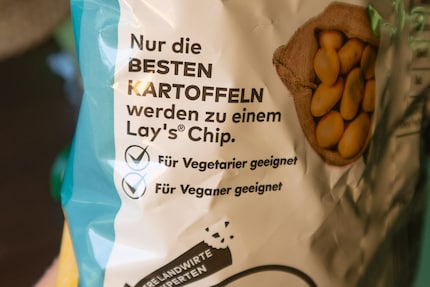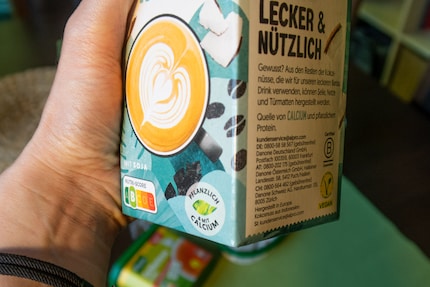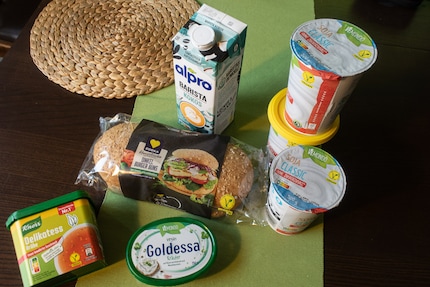
News + Trends
Most people want them, but many don't understand them: food labelling
by Debora Pape

Vegetarian and vegan foods are often labelled to make them easier to find on supermarket shelves. However, this can be a problem for companies.
You are probably familiar with the bright yellow, round «Vegan» label on food packaging. The green «Vegetarian» version of the symbol is also used somewhat less frequently. They are called V-labels and are the best-known labelling for vegetarian and vegan foods.
The eye-catching labelling makes it easier to identify meat-free or purely plant-based foods, for example. According to a study, it is mainly younger people who rely on it and specifically look for the label.
However, it can put off people who are sceptical about plant-based foods. The Vegconomist magazine, which reports on vegan business news, asked seven managers from the plant-based industry for their opinions and experiences on this topic. According to the report, manufacturers have to manage a balancing act between customer wishes and economic requirements: on the one hand, the demand for transparent labelling, and on the other, the need to optimise profits. And almost all of those surveyed take a rather critical view of the use of eye-catching «Vegan» labelling.
Currently, around nine per cent of people in Europe eat a purely vegetarian or vegan diet. Depending on the survey, the group of flexitarians is significantly larger. In some cases, up to around 50 per cent state that they consciously reduce their meat consumption. On the other hand, there is a group of people who do not categorise themselves as having a particular diet and therefore eat everything (omnivores).
This group is not homogeneous. It includes people who fundamentally reject plant-based alternatives. But it also includes people who have no opinion on the subject or are open to it.
A US study shows that people who are not interested in a flexitarian, vegetarian or vegan diet are less likely to buy products with a vegan label. They associate such foods with sacrifice and a reduction in flavour. And then the products are often more expensive too.
Rebecca Göckel, Co-Managing Director of Nomoo, has also noticed this. Her company produces exclusively plant-based ice cream. She says she has experienced a lot of scepticism towards vegan labels. It therefore makes sense to think less in terms of labels and focus more on flavour and a modern, conscious lifestyle in marketing.
Elisabeth Prein, Managing Director of Pfeffer & Frost, has also experienced this. After the introduction of a vegan gingerbread line, there was a lot of feedback from customers wanting to cancel an accidental order of the vegan version.
The company then switched production to exclusively plant-based gingerbread without eggs and honey, without widely communicating the change. The fact that the gingerbread is all vegan is now only stated in the small print - the company has also dispensed with the V-label. The negative customer feedback has disappeared as a result of the measure.

Marketing professor and author Prof Dr Johanna Gollnhofer from the University of St. Gallen suggests a similar approach. The frequent use of the word «Vegan» is not helpful for the normalisation of a plant-based diet because it puts many people off,
A better recommendation is the «vegan» way: companies could include more products in their range that have always been purely plant-based and would be bought anyway, such as Italian wheat semolina pasta, apple sauce, margarine and hummus. In this way, plant-based products could gradually gain a larger market share.
Matthias Rohra, Managing Director of ProVeg Deutschland, emphasises the benefits of the V-label, as it helps with orientation and creates trust. However, in his experience, non-vegans could be put off by such labelling. He therefore also advocates a cautious choice of words on packaging.
Alexander Schmolling, Head of Marketing at Feinkost Popp, which also offers vegan spreads and salads, also says that although the V-label reaches the vegan target group, it puts off omnivores. Other labelling, such as «plant-based», unconsciously lowers barriers. He sees the «Vegan» label more in the product details. However, his company currently uses the V-label and the «Vegan» wording itself, as the product range shows.

The vegan lifestyle doesn't just include nutrition, however, but all areas of life. However, the yellow V-label is not represented in the textile sector. Sarah Kokal, founder of the 100 per cent vegan fashion label we samay, has completely removed the term «vegan» due to her bad experience. Customers could not identify with it. It would be better to use terms such as «free from», «plant-based» or «Peta-certified».
Only Renato Pichler, Managing Director of Swissveg, sees the V-label in an exclusively positive light. He says it signals quality and transparency, is unobtrusive and makes no marketing promises. He notes that customers are specifically looking for it, while the labelling is either ignored or positively received outside the vegan Community. According to him, it supports the normalisation of a plant-based diet.
Companies that want to sell purely plant-based products therefore need to consider their marketing strategy. Possibilities include:

New vegan products are constantly coming onto the market, but are often discontinued because they do not find enough customers. A few weeks ago, for example, McDonald's Austria removed the McPlant burger patty from the menu because demand was too low. An example of the fact that there is no magic formula for the market success of vegan food.
Which path is the right one for the sustainable success of vegan food remains unclear. The statements made by industry decision-makers provide some clues, but are hardly representative of the industry as a whole.
If you want to see which new vegan products are appearing and which are disappearing, you can follow the vegan novelties channel on Instagram.
Feels just as comfortable in front of a gaming PC as she does in a hammock in the garden. Likes the Roman Empire, container ships and science fiction books. Focuses mostly on unearthing news stories about IT and smart products.
Interesting facts about products, behind-the-scenes looks at manufacturers and deep-dives on interesting people.
Show all